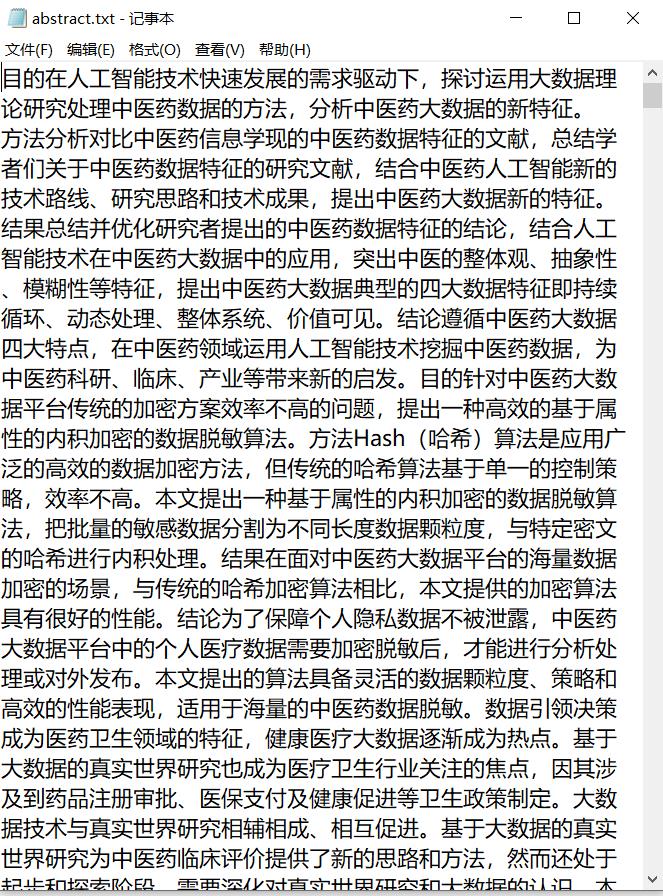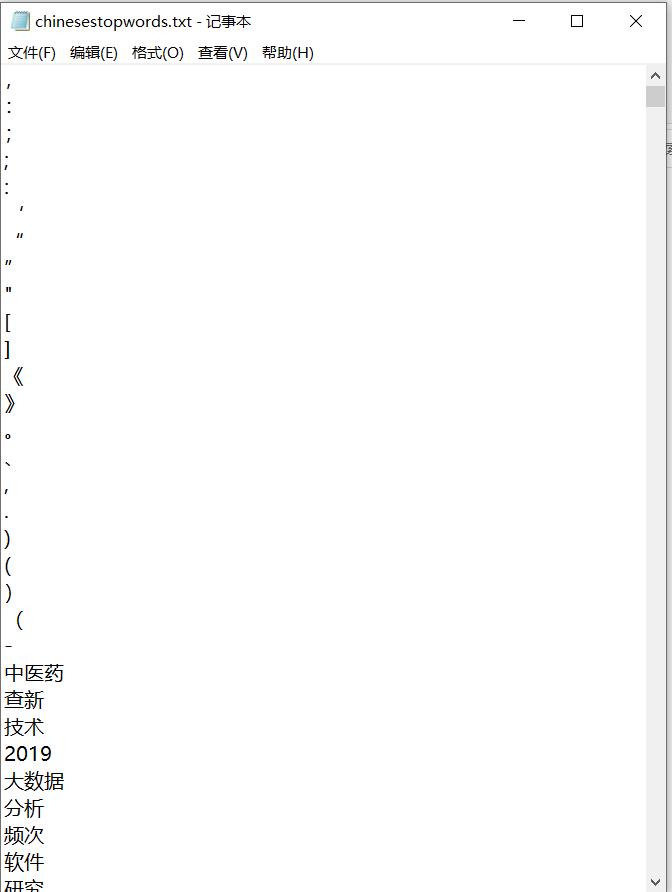python中文分词+词频统计
Posted 爱吃糖的月妖妖
tags:
篇首语:本文由小常识网(cha138.com)小编为大家整理,主要介绍了python中文分词+词频统计相关的知识,希望对你有一定的参考价值。
文章目录
前言
本文记录了一下Python在文本处理时的一些过程+代码
一、文本导入
我准备了一个名为abstract.txt的文本文件

接着是在网上下载了stopword.txt(用于结巴分词时的停用词)

有一些是自己觉得没有用加上去的
另外建立了自己的词典extraDict.txt

准备工作做好了,就来看看怎么使用吧!
二、使用步骤
1.引入库
代码如下:
import jieba
from jieba.analyse import extract_tags
from sklearn.feature_extraction.text import TfidfVectorizer2.读入数据
代码如下:
jieba.load_userdict('extraDict.txt') # 导入自己建立词典3.取出停用词表
def stopwordlist():
stopwords = [line.strip() for line in open('chinesestopwords.txt', encoding='UTF-8').readlines()]
# ---停用词补充,视具体情况而定---
i = 0
for i in range(19):
stopwords.append(str(10 + i))
# ----------------------
return stopwords4.分词并去停用词(此时可以直接利用python原有的函数进行词频统计)
def seg_word(line):
# seg=jieba.cut_for_search(line.strip())
seg = jieba.cut(line.strip())
temp = ""
counts =
wordstop = stopwordlist()
for word in seg:
if word not in wordstop:
if word != ' ':
temp += word
temp += '\\n'
counts[word] = counts.get(word, 0) + 1#统计每个词出现的次数
return temp #显示分词结果
#return str(sorted(counts.items(), key=lambda x: x[1], reverse=True)[:20]) # 统计出现前二十最多的词及次数5. 输出分词并去停用词的有用的词到txt
def output(inputfilename, outputfilename):
inputfile = open(inputfilename, encoding='UTF-8', mode='r')
outputfile = open(outputfilename, encoding='UTF-8', mode='w')
for line in inputfile.readlines():
line_seg = seg_word(line)
outputfile.write(line_seg)
inputfile.close()
outputfile.close()
return outputfile6.函数调用
if __name__ == '__main__':
print("__name__", __name__)
inputfilename = 'abstract.txt'
outputfilename = 'a1.txt'
output(inputfilename, outputfilename)7.结果
总结
以上就是今天要讲的内容,本文仅仅简单介绍了python的中文分词及词频统计,欢迎指正!
python进行分词及统计词频
#!/usr/bin/python
# -*- coding: UTF-8 -*-
#分词统计词频
import jieba
import re
from collections import Counter
content=""
filename=r"../data/commentText.txt";
result = "result_com.txt"
r=‘[0-9\s+\.\!\/_,$%^*()?;;:-【】+\"\‘]+|[+——!,;:。?、 ~@#¥%……&*()]+‘
with open(filename,‘r‘,encoding=‘utf-8‘) as fr:
print("ss")
content=re.sub(r," ",fr.read())
#re.sub(pattern, repl, string, count=0, flags=0)
# pattern:表示正则表达式中的模式字符串;
# repl:被替换的字符串(既可以是字符串,也可以是函数);
# string:要被处理的,要被替换的字符串;
# count:匹配的次数, 默认是全部替换
# flags:具体用处不详
data=jieba.cut(content,cut_all=False)
data=dict(Counter(data))#dict() 函数用于创建一个字典。Counter 是实现的 dict 的一个子类,可以用来方便地计数。
with open(result,‘w‘,encoding="utf-8")as fw:
for k,v in data.items():
if(len(k)>1):
fw.write(k)
fw.write("\t%d\n"%v)
语言:Python3.7 包:jieba counter re
出错内容:由于没有在写入文件中规定其编码方式,导致为16进制写入,设置编码方式即可
以上是关于python中文分词+词频统计的主要内容,如果未能解决你的问题,请参考以下文章
